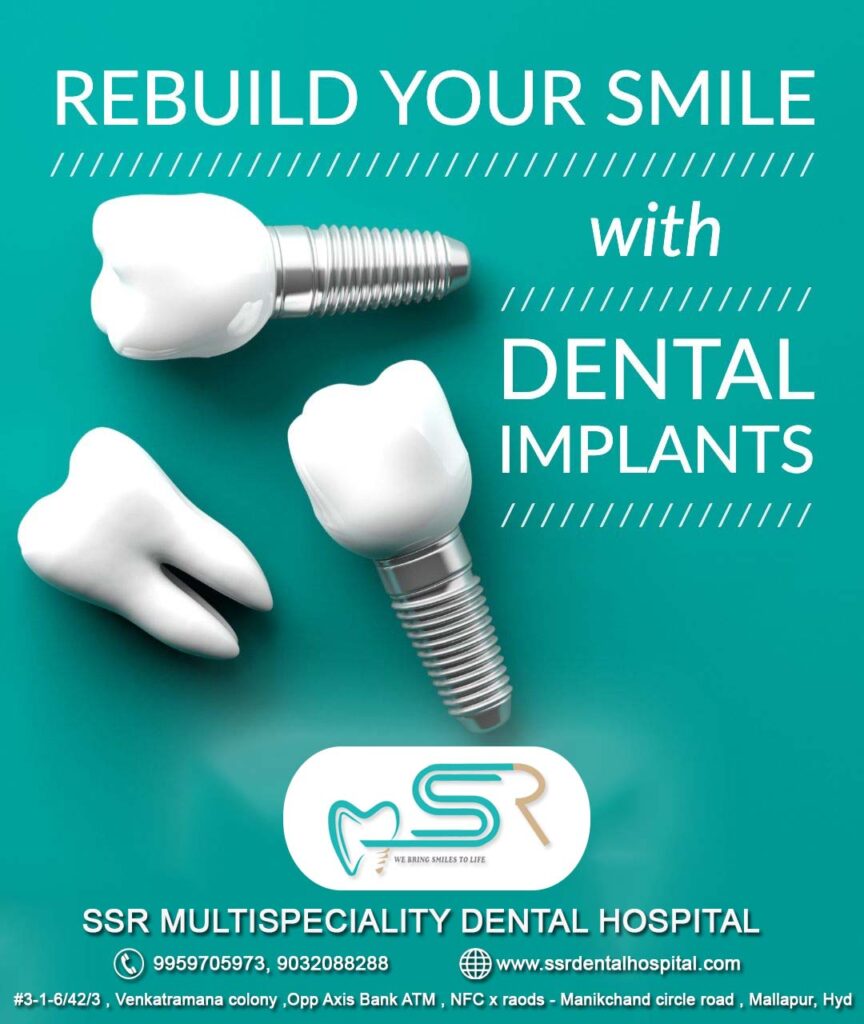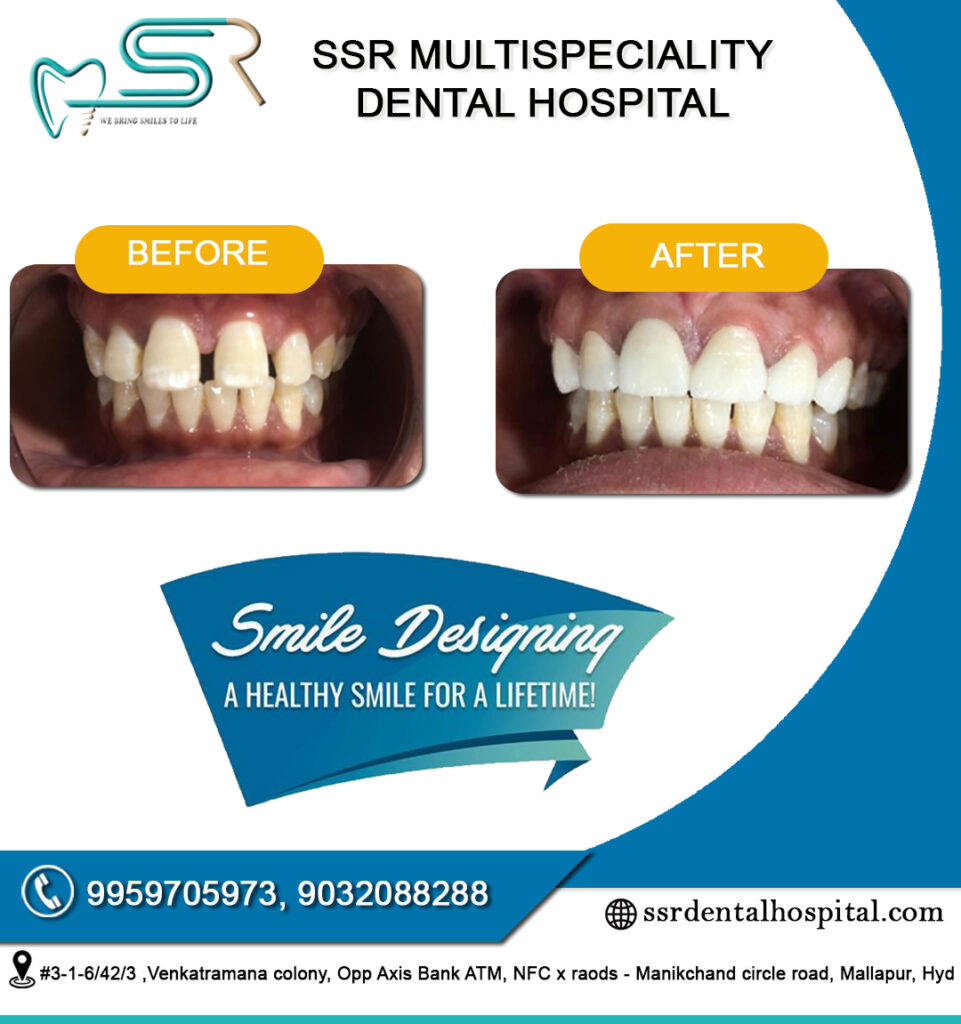Blog

Root Canal Treatment :
Root canal treatment, also known as endodontic treatment, is a common dental procedure that is performed to treat a damaged or infected tooth. Mallapur SSR Dental Hospital is a leading provider of root canal treatment in the area, offering patients expert care and advanced technologies to help restore the health and function of their teeth.
At Mallapur SSR Dental Hospital, root canal treatment is performed by a team of experienced endodontists who use the latest techniques and technologies to ensure optimal results. The treatment typically involves several steps, including:
Examination and diagnosis: Your dentist will perform a thorough examination to determine the extent of the damage and the best course of treatment.
Anesthesia: Local anesthesia is used to numb the area around the affected tooth and reduce pain and discomfort during the procedure.
Removal of damaged tissue: The dentist will create an opening in the tooth and remove the damaged or infected tissue from the root canal.
Cleaning and shaping: The dentist will clean and shape the root canal to prepare it for the filling material.
Filling and sealing: A biocompatible material is used to fill the root canal and seal it to prevent further infection or damage.
Restoration: A dental crown or filling is placed over the tooth to restore its shape and function.

Best dental implants treatment:
Dental implants are a popular and effective solution for missing teeth. Mallapur SSR Dental Hospital is a leading provider of dental implant treatment in the area, offering patients expert care and the latest technologies to help restore their smiles.
The treatment typically involves several steps, including:
Examination and diagnosis: Your dentist will perform a thorough examination and take X-rays or CT scans to determine the best course of treatment.
Implant placement: The implant is placed into the jawbone using a surgical procedure. Patients may receive local anesthesia or sedation to reduce discomfort during the procedure.
Osseointegration: Over several weeks or months, the implant will fuse with the jawbone in a process called osseointegration. During this time, patients may wear a temporary restoration to protect the implant and maintain their appearance.
Abutment placement: Once the implant has fused with the jawbone, an abutment is placed on top of the implant to connect the replacement tooth or bridge.
Restoration: A custom-made replacement tooth or bridge is attached to the abutment to restore the appearance and function of the missing tooth.

Smile designing is a cosmetic dental procedure that aims to enhance the appearance of a patient’s smile. It involves a combination of different dental treatments, such as teeth whitening, dental veneers, dental implants, and orthodontic treatments, to achieve a beautiful and natural-looking smile.
Mallapur SSR Dental Hospital is a leading provider of smile designing in the area, offering patients a personalized treatment plan tailored to their specific needs and goals. The procedure is performed by a team of experienced cosmetic dentists who use the latest techniques and technologies to help patients achieve the smile of their dreams.
Overall, smile designing is a comprehensive and personalized cosmetic dental procedure that can transform a patient’s smile. Mallapur SSR Dental Hospital is a top provider of this procedure, offering patients expert care and personalized treatment plans to help them achieve a beautiful and natural-looking smile.
There are various reasons a patient may pursue a cosmetic smile design treatment, including the desire to:
- Look younger
- Be more confident.
- Improve chances for
- Career advancement
- Feel more attractive.

Tips to improve oral health:
Maintaining good oral health is essential for overall health and well-being. At Mallapur SSR Dental Hospital, we believe that prevention is key when it comes to oral health. Here are some tips to improve oral health and prevent dental problems:
Brush twice a day: Brush your teeth for at least two minutes, twice a day, using fluoride toothpaste. Make sure to brush all surfaces of your teeth, including the front, back, and chewing surfaces.
Floss daily: Flossing helps remove plaque and food particles that your toothbrush may not be able to reach. Make sure to floss between all teeth, and gently curve the floss around each tooth to clean beneath the gumline.
Use mouthwash: Mouthwash can help kill bacteria and freshen breath. Choose an alcohol-free mouthwash and use it after brushing and flossing.
Avoid sugary and acidic foods: Sugary and acidic foods can erode tooth enamel and cause cavities. Limit your intake of sugary and acidic foods and drinks, and opt for healthier options like fruits and vegetables.
Drink plenty of water: Water helps rinse away food particles and bacteria in your mouth. Make sure to drink plenty of water throughout the day, especially after meals.

For those who wear dentures, eating without them can be a challenging experience. However, there may be times when it is necessary to eat without dentures, such as when cleaning them or if they become damaged or lost. At Mallapur SSR Dental Hospital, we understand the difficulties that can arise when eating without dentures, and we offer some tips to help make the experience more manageable.
Start with soft foods: Begin by eating soft, easy-to-chew foods, such as scrambled eggs, mashed potatoes, or soup. Avoid hard or crunchy foods, such as nuts or raw vegetables, as they may be difficult to chew without dentures.
Cut food into small pieces: Use a knife or scissors to cut food into small pieces, making it easier to chew and swallow. Avoid large or tough pieces of meat, as they can be difficult to chew without dentures.
Chew slowly and carefully: Take small bites and chew slowly and carefully. Use your front teeth and your tongue to help move the food around your mouth and break it down into smaller pieces.
Avoid sticky or gooey foods: Sticky or gooey foods, such as peanut butter or caramel, can be difficult to chew and may stick to the roof of your mouth or teeth. Avoid these foods when eating without dentures.
Rinse with water: After eating, rinse your mouth with water to remove any food particles that may have become lodged in your teeth or gums.
Consider temporary denture alternatives: If you anticipate having to eat without dentures for an extended period, consider using temporary denture alternatives, such as adhesive strips or denture cushions. These products can provide temporary relief and help improve your ability to eat and speak.
